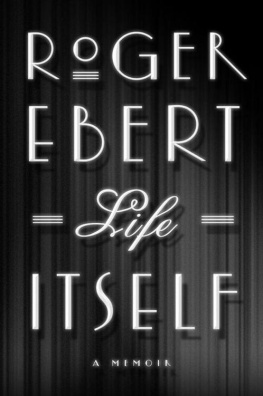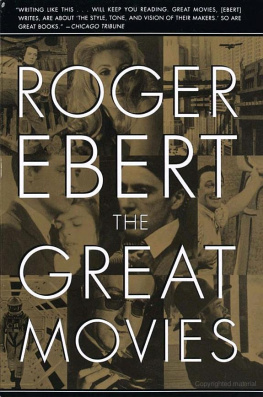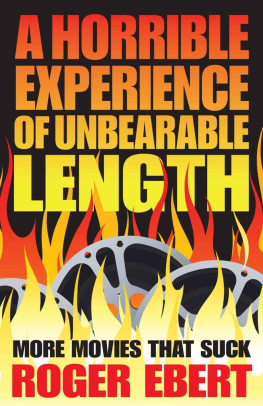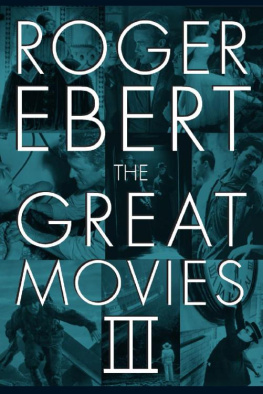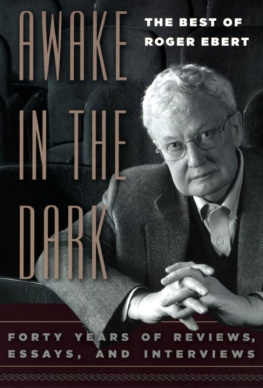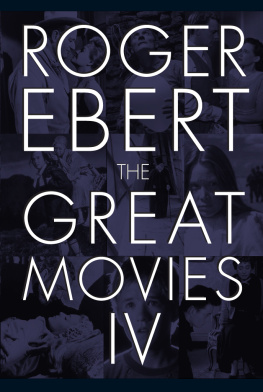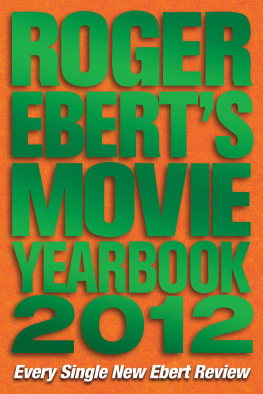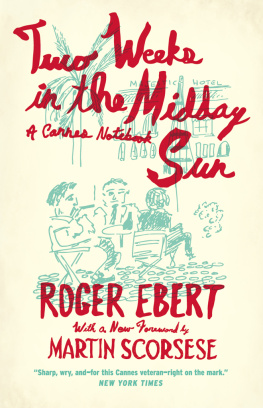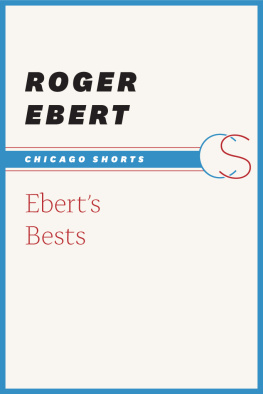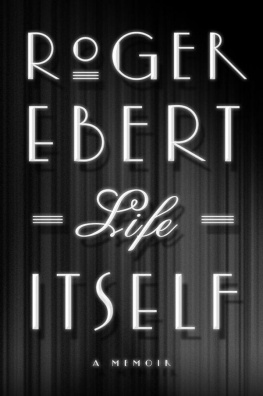Roger Ebert - Life Itself: A Memoir
Here you can read online Roger Ebert - Life Itself: A Memoir full text of the book (entire story) in english for free. Download pdf and epub, get meaning, cover and reviews about this ebook. year: 2011, publisher: Grand Central Publishing, genre: Non-fiction. Description of the work, (preface) as well as reviews are available. Best literature library LitArk.com created for fans of good reading and offers a wide selection of genres:
Romance novel
Science fiction
Adventure
Detective
Science
History
Home and family
Prose
Art
Politics
Computer
Non-fiction
Religion
Business
Children
Humor
Choose a favorite category and find really read worthwhile books. Enjoy immersion in the world of imagination, feel the emotions of the characters or learn something new for yourself, make an fascinating discovery.
- Book:Life Itself: A Memoir
- Author:
- Publisher:Grand Central Publishing
- Genre:
- Year:2011
- Rating:4 / 5
- Favourites:Add to favourites
- Your mark:
- 80
- 1
- 2
- 3
- 4
- 5
Life Itself: A Memoir: summary, description and annotation
We offer to read an annotation, description, summary or preface (depends on what the author of the book "Life Itself: A Memoir" wrote himself). If you haven't found the necessary information about the book — write in the comments, we will try to find it.
Life Itself: A Memoir — read online for free the complete book (whole text) full work
Below is the text of the book, divided by pages. System saving the place of the last page read, allows you to conveniently read the book "Life Itself: A Memoir" online for free, without having to search again every time where you left off. Put a bookmark, and you can go to the page where you finished reading at any time.
Font size:
Interval:
Bookmark:
ITSELF
A Memoir

NEW YORK BOSTON
For Chaz
and
For my parents
I WAS BORN inside the movie of my life. The visuals were before me, the audio surrounded me, the plot unfolded inevitably but not necessarily. I dont remember how I got into the movie, but it continues to entertain me. At first the frames flicker without connection, as they do in Bergmans Persona after the film breaks and begins again. I am flat on my stomach on the front sidewalk, my eyes an inch from a procession of ants. What these are I do not know. It is the only sidewalk in my life, in front of the only house. I have seen grasshoppers and ladybugs. My uncle Bob extends the business end of a fly swatter toward me, and I grasp it and try to walk toward him. Voices encourage me. Hal Holmes has a red tricycle and I cry because I want it for my own. My parents curiously set tubes afire and blow smoke from their mouths. I dont want to eat, and my aunt Martha puts me on her lap and says shell pinch me if I dont open my mouth. Gary Wikoff is sitting next to me in the kitchen. He asks me how old I am today, and I hold up three fingers. At Tots Play School, I try to ride on the back of Mrs. Meadrows dog, and it bites me on the cheek. I am taken to Mercy Hospital to be stitched up. Everyone there is shouting because the Panama Limited went off the rails north of town. People crowd around. Aunt Martha brings in Doctor Collins, her boss, who is a dentist. He tells my mother, Annabel, its the same thing to put a few stitches on the outside of a cheek as on the inside. I start crying. Why is the thought of stitches outside my cheek more terrifying than stitches anywhere else?
The movie settles down. I live at 410 East Washington Street in Urbana, Illinois. My telephone number is 72611. I am never to forget those things. I run the length of the hallway from the living room to my bedroom, leaping into the air and landing on my bed. Daddy tells me to stop that or Ill break the bed boards. The basement smells like green onions. The light beside my bed is like a water pump, and the handle turns it on and off. I wear flannel shirts. My gloves are attached to a string through the sleeves because I am always losing them. My mother says today my father is going to teach me to tie my shoes for myself. It cant be explained in words, he tells me. Just follow my fingers. I still do. It cannot be explained in words.
When I returned to 410 East Washington with my wife, Chaz, in 1990, I saw that the hallway was only a few yards long. I got the feeling I sometimes have when reality realigns itself. Its a tingling sensation moving like a wave through my body. I know the feeling precisely. I doubt Ive experienced it ten times in my life. I felt it at Smith Drugs when I was seven or eight and opened a nudist magazine and discovered that all women had breasts. I felt it when my father told me he had cancer. I felt it when I proposed marriage. Yes, and I felt it in the old Palais des Festivals at Cannes, when the Ride of the Valkyries played during the helicopter attack in Apocalypse Now.
I was an only child. I heard that over and over again. Roger is an only boy. My best friends, Hal and Gary, were only children, too. We were born at the beginning of World War II, four or five years earlier than the baby boomers, which would be an advantage all of our lives. The war was the great mystery of those years. I knew we were at war against Germany and Japan. I knew Uncle Bill had gone away to fight. I was told, your father is too old so they wont take him. He put bicycle clips on his work pants and cycled to work every morning. There was rationing. If Harry Rusk the grocer had a chicken, we had chicken on Sunday. Many nights we had oatmeal. There was no butter. Oleo came in a plastic bag, and you squeezed the orange dye and kneaded it to make it look like butter. Its against the law to sell it already looking like butter, my parents explained. Daddy and Uncle Johnny ordered cartons of cigarettes through the mail from Kentucky. Everybody smoked. My mother, my father, my uncles and aunts, the neighbors, everybody. When we gathered at my grandmothers for a big dinner, that meant nine or ten people sitting around the table smoking. They did it over and over, hour after hour, as if it were an assignment.
After the war, you could buy cars again. The cars were long, wide, and deep, and I was barely tall enough to see out the window. Three could sit across in the front seat, and three and a child in the back. You filled up at Norman Earlys Shell station. He pumped the gas by hand into a transparent glass cylinder. He gave you Green Stamps. The great danger was having a blowout. We drove on the Danville Hard Road. It was a one-lane slab. When another car approached, you slowed down and put two wheels over on the side. That was when you had to be afraid of a blowout.
One of the rewards of growing old is that you can truthfully say you lived in the past. I remember the day my father sat down next to me and said he had something he wanted to tell me. We had dropped an atomic bomb on the Japanese and that might mean the war was over. I asked him what an atomic bomb was. He said it was a bomb as big as a hundred other bombs. I said I hoped we dropped a hundred of them. My father said, Dont even say that, Roger. Its a terrible thing. My mother came in from the kitchen. Whats terrible? My father told her. Oh, yes, honey, she told me. All those poor people burned up alive.
How can I tell you what they said? I remember them saying it. In these years after my illness, when I can no longer speak and am set aside from the daily flow, I live more in my memory and discover that a great many things are safely stored away. It all seems still to be in there somewhere. At our fiftieth high school reunion, Pegeen Linn remembered how self-conscious she was when she acted in a high school play and had to kiss a boy on the stage in front of the whole school. She smiled at me. And that boy was you. You had this monologue and then I had to walk on and kiss you, with everybody watching. I discovered that the monologue was still there in my memory, untouched. Do you ever have that happen? You find a moment from your past, undisturbed ever since, still vivid, surprising you. In high school I fell under the spell of Thomas Wolfe: A stone, a leaf, an unfound door; of a stone, a leaf, a door. And of all the forgotten faces. Now I feel all the faces returning to memory.
The British satirist Auberon Waugh once wrote a letter to the editor of the Daily Telegraph asking readers to supply information about his life between birth and the present, explaining that he was writing his memoirs and had no memories from those years. I find myself in the opposite position. I remember everything. All my life Ive been visited by unexpected flashes of memory unrelated to anything taking place at the moment. These retrieved moments I consider and replace on the shelf. When I began writing this book, memories came flooding to the surface, not because of any conscious effort but simply in the stream of writing. I started in a direction and the memories were waiting there, sometimes of things I hadnt consciously thought about since. Hypnosis is said to enable us to retrieve past memories. When I write, I fall into the zone many writers, painters, musicians, athletes, and craftsmen of all sorts seem to share: In doing something I enjoy and am expert at, deliberate thought falls aside and it is all just there. I think of the next word no more than the composer thinks of the next note.
I lived in a world of words long before I was aware of it. As an only child I turned to books as soon as I could read. There was a persistent need not only to write, but to publish. In grade school I had an essay published in the mimeographed paper, and that led me directly to a hectograph, a primitive publishing toy with a tray of jelly. You wrote in a special purple ink, the jelly absorbed it, and you could impress it on perhaps a dozen sheets of paper before it grew too faint. With this I wrote and published the
Font size:
Interval:
Bookmark:
Similar books «Life Itself: A Memoir»
Look at similar books to Life Itself: A Memoir. We have selected literature similar in name and meaning in the hope of providing readers with more options to find new, interesting, not yet read works.
Discussion, reviews of the book Life Itself: A Memoir and just readers' own opinions. Leave your comments, write what you think about the work, its meaning or the main characters. Specify what exactly you liked and what you didn't like, and why you think so.

